Research Methodology: Organizational Culture, Performance & Engagement
VerifiedAdded on 2023/04/21
|16
|3850
|353
Thesis and Dissertation
AI Summary
This document presents a comprehensive research methodology chapter from a Master's thesis focusing on the impact of organizational culture on employee engagement and organizational performance. It details the research philosophy (positivism), approach (deductive), and design (exploratory) chosen for the study, justifying each selection. The chapter outlines the data collection methods, including both primary (qualitative interviews and case studies within a healthcare organization) and secondary data sources. It also addresses sampling techniques, research settings, data analysis methods, and ethical considerations. The research timeline is provided, offering a complete overview of the methodological framework employed to investigate the relationship between organizational culture, employee engagement, and organizational performance. Desklib provides access to similar past papers and solved assignments for students.
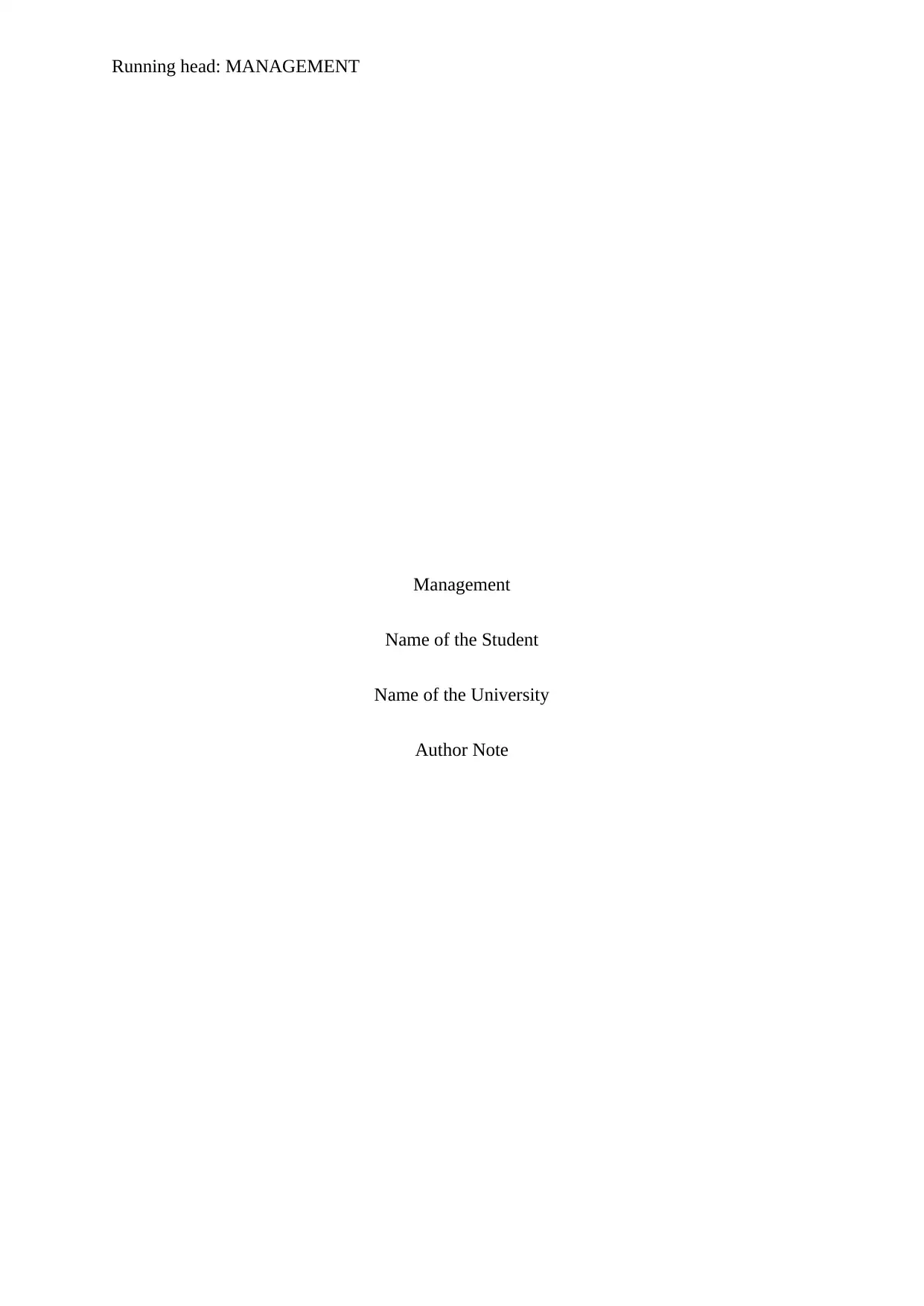
Running head: MANAGEMENT
Management
Name of the Student
Name of the University
Author Note
Management
Name of the Student
Name of the University
Author Note
Paraphrase This Document
Need a fresh take? Get an instant paraphrase of this document with our AI Paraphraser
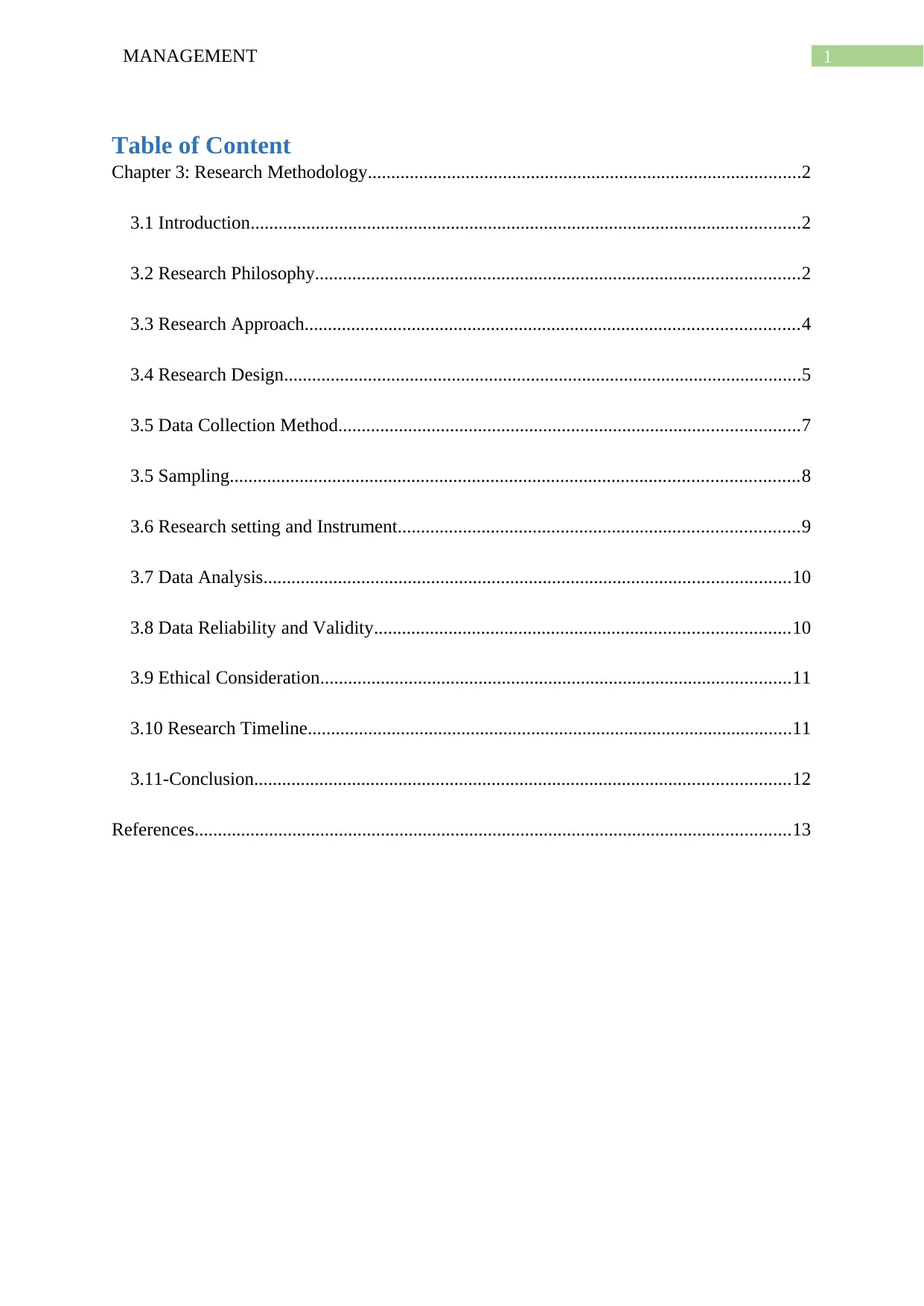
1MANAGEMENT
Table of Content
Chapter 3: Research Methodology.............................................................................................2
3.1 Introduction......................................................................................................................2
3.2 Research Philosophy........................................................................................................2
3.3 Research Approach..........................................................................................................4
3.4 Research Design...............................................................................................................5
3.5 Data Collection Method...................................................................................................7
3.5 Sampling..........................................................................................................................8
3.6 Research setting and Instrument......................................................................................9
3.7 Data Analysis.................................................................................................................10
3.8 Data Reliability and Validity.........................................................................................10
3.9 Ethical Consideration.....................................................................................................11
3.10 Research Timeline........................................................................................................11
3.11-Conclusion...................................................................................................................12
References................................................................................................................................13
Table of Content
Chapter 3: Research Methodology.............................................................................................2
3.1 Introduction......................................................................................................................2
3.2 Research Philosophy........................................................................................................2
3.3 Research Approach..........................................................................................................4
3.4 Research Design...............................................................................................................5
3.5 Data Collection Method...................................................................................................7
3.5 Sampling..........................................................................................................................8
3.6 Research setting and Instrument......................................................................................9
3.7 Data Analysis.................................................................................................................10
3.8 Data Reliability and Validity.........................................................................................10
3.9 Ethical Consideration.....................................................................................................11
3.10 Research Timeline........................................................................................................11
3.11-Conclusion...................................................................................................................12
References................................................................................................................................13
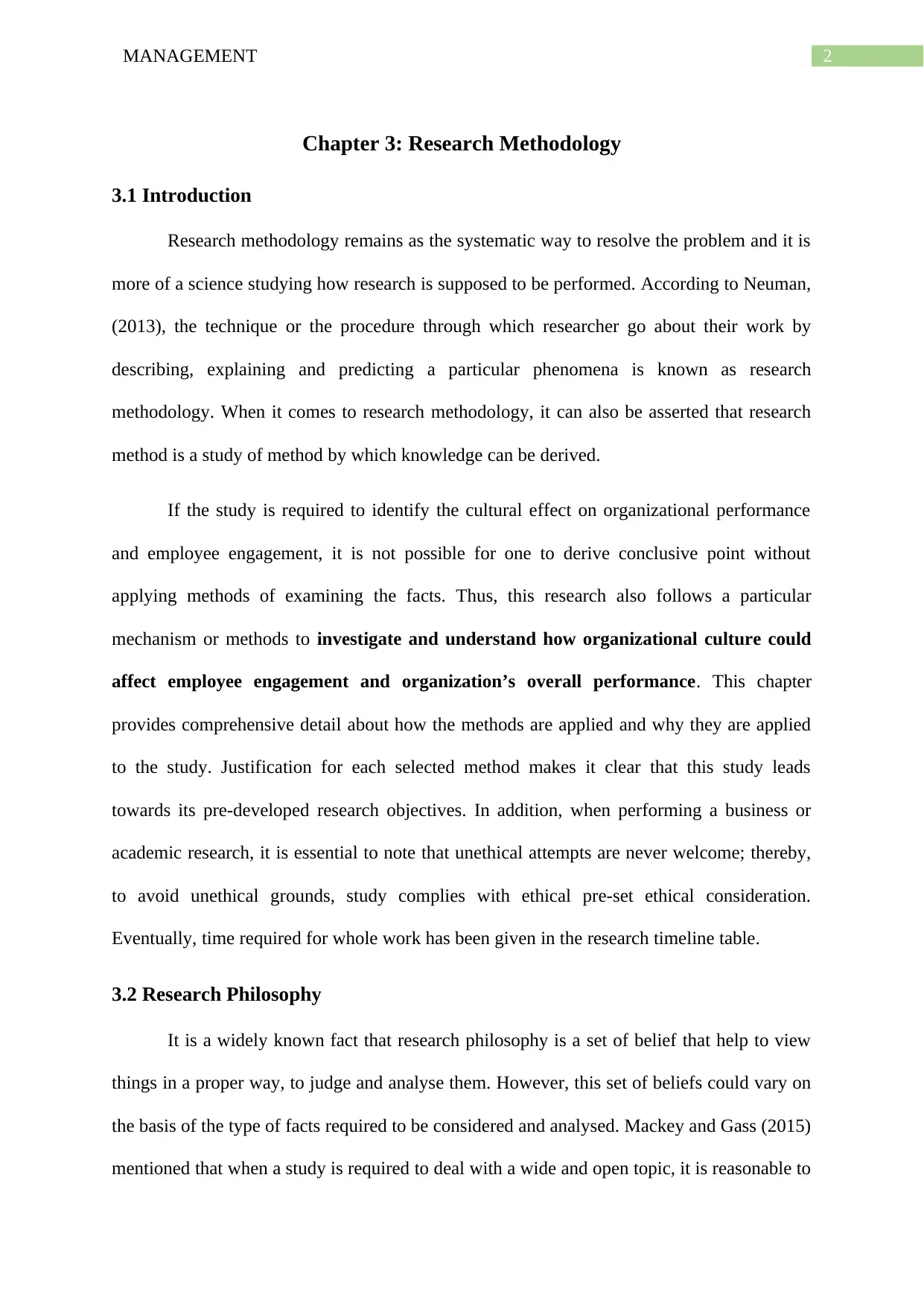
2MANAGEMENT
Chapter 3: Research Methodology
3.1 Introduction
Research methodology remains as the systematic way to resolve the problem and it is
more of a science studying how research is supposed to be performed. According to Neuman,
(2013), the technique or the procedure through which researcher go about their work by
describing, explaining and predicting a particular phenomena is known as research
methodology. When it comes to research methodology, it can also be asserted that research
method is a study of method by which knowledge can be derived.
If the study is required to identify the cultural effect on organizational performance
and employee engagement, it is not possible for one to derive conclusive point without
applying methods of examining the facts. Thus, this research also follows a particular
mechanism or methods to investigate and understand how organizational culture could
affect employee engagement and organization’s overall performance. This chapter
provides comprehensive detail about how the methods are applied and why they are applied
to the study. Justification for each selected method makes it clear that this study leads
towards its pre-developed research objectives. In addition, when performing a business or
academic research, it is essential to note that unethical attempts are never welcome; thereby,
to avoid unethical grounds, study complies with ethical pre-set ethical consideration.
Eventually, time required for whole work has been given in the research timeline table.
3.2 Research Philosophy
It is a widely known fact that research philosophy is a set of belief that help to view
things in a proper way, to judge and analyse them. However, this set of beliefs could vary on
the basis of the type of facts required to be considered and analysed. Mackey and Gass (2015)
mentioned that when a study is required to deal with a wide and open topic, it is reasonable to
Chapter 3: Research Methodology
3.1 Introduction
Research methodology remains as the systematic way to resolve the problem and it is
more of a science studying how research is supposed to be performed. According to Neuman,
(2013), the technique or the procedure through which researcher go about their work by
describing, explaining and predicting a particular phenomena is known as research
methodology. When it comes to research methodology, it can also be asserted that research
method is a study of method by which knowledge can be derived.
If the study is required to identify the cultural effect on organizational performance
and employee engagement, it is not possible for one to derive conclusive point without
applying methods of examining the facts. Thus, this research also follows a particular
mechanism or methods to investigate and understand how organizational culture could
affect employee engagement and organization’s overall performance. This chapter
provides comprehensive detail about how the methods are applied and why they are applied
to the study. Justification for each selected method makes it clear that this study leads
towards its pre-developed research objectives. In addition, when performing a business or
academic research, it is essential to note that unethical attempts are never welcome; thereby,
to avoid unethical grounds, study complies with ethical pre-set ethical consideration.
Eventually, time required for whole work has been given in the research timeline table.
3.2 Research Philosophy
It is a widely known fact that research philosophy is a set of belief that help to view
things in a proper way, to judge and analyse them. However, this set of beliefs could vary on
the basis of the type of facts required to be considered and analysed. Mackey and Gass (2015)
mentioned that when a study is required to deal with a wide and open topic, it is reasonable to
⊘ This is a preview!⊘
Do you want full access?
Subscribe today to unlock all pages.

Trusted by 1+ million students worldwide
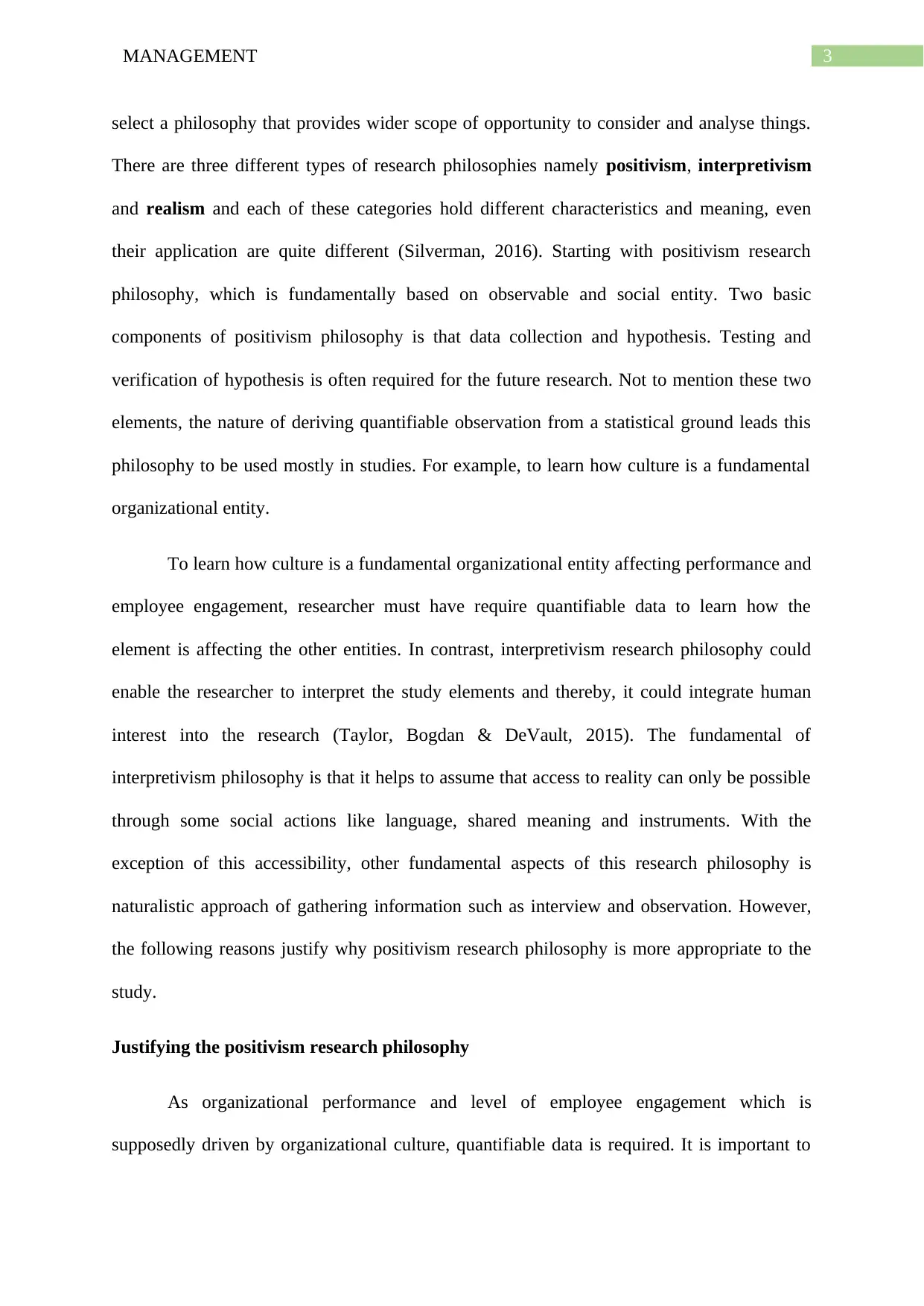
3MANAGEMENT
select a philosophy that provides wider scope of opportunity to consider and analyse things.
There are three different types of research philosophies namely positivism, interpretivism
and realism and each of these categories hold different characteristics and meaning, even
their application are quite different (Silverman, 2016). Starting with positivism research
philosophy, which is fundamentally based on observable and social entity. Two basic
components of positivism philosophy is that data collection and hypothesis. Testing and
verification of hypothesis is often required for the future research. Not to mention these two
elements, the nature of deriving quantifiable observation from a statistical ground leads this
philosophy to be used mostly in studies. For example, to learn how culture is a fundamental
organizational entity.
To learn how culture is a fundamental organizational entity affecting performance and
employee engagement, researcher must have require quantifiable data to learn how the
element is affecting the other entities. In contrast, interpretivism research philosophy could
enable the researcher to interpret the study elements and thereby, it could integrate human
interest into the research (Taylor, Bogdan & DeVault, 2015). The fundamental of
interpretivism philosophy is that it helps to assume that access to reality can only be possible
through some social actions like language, shared meaning and instruments. With the
exception of this accessibility, other fundamental aspects of this research philosophy is
naturalistic approach of gathering information such as interview and observation. However,
the following reasons justify why positivism research philosophy is more appropriate to the
study.
Justifying the positivism research philosophy
As organizational performance and level of employee engagement which is
supposedly driven by organizational culture, quantifiable data is required. It is important to
select a philosophy that provides wider scope of opportunity to consider and analyse things.
There are three different types of research philosophies namely positivism, interpretivism
and realism and each of these categories hold different characteristics and meaning, even
their application are quite different (Silverman, 2016). Starting with positivism research
philosophy, which is fundamentally based on observable and social entity. Two basic
components of positivism philosophy is that data collection and hypothesis. Testing and
verification of hypothesis is often required for the future research. Not to mention these two
elements, the nature of deriving quantifiable observation from a statistical ground leads this
philosophy to be used mostly in studies. For example, to learn how culture is a fundamental
organizational entity.
To learn how culture is a fundamental organizational entity affecting performance and
employee engagement, researcher must have require quantifiable data to learn how the
element is affecting the other entities. In contrast, interpretivism research philosophy could
enable the researcher to interpret the study elements and thereby, it could integrate human
interest into the research (Taylor, Bogdan & DeVault, 2015). The fundamental of
interpretivism philosophy is that it helps to assume that access to reality can only be possible
through some social actions like language, shared meaning and instruments. With the
exception of this accessibility, other fundamental aspects of this research philosophy is
naturalistic approach of gathering information such as interview and observation. However,
the following reasons justify why positivism research philosophy is more appropriate to the
study.
Justifying the positivism research philosophy
As organizational performance and level of employee engagement which is
supposedly driven by organizational culture, quantifiable data is required. It is important to
Paraphrase This Document
Need a fresh take? Get an instant paraphrase of this document with our AI Paraphraser
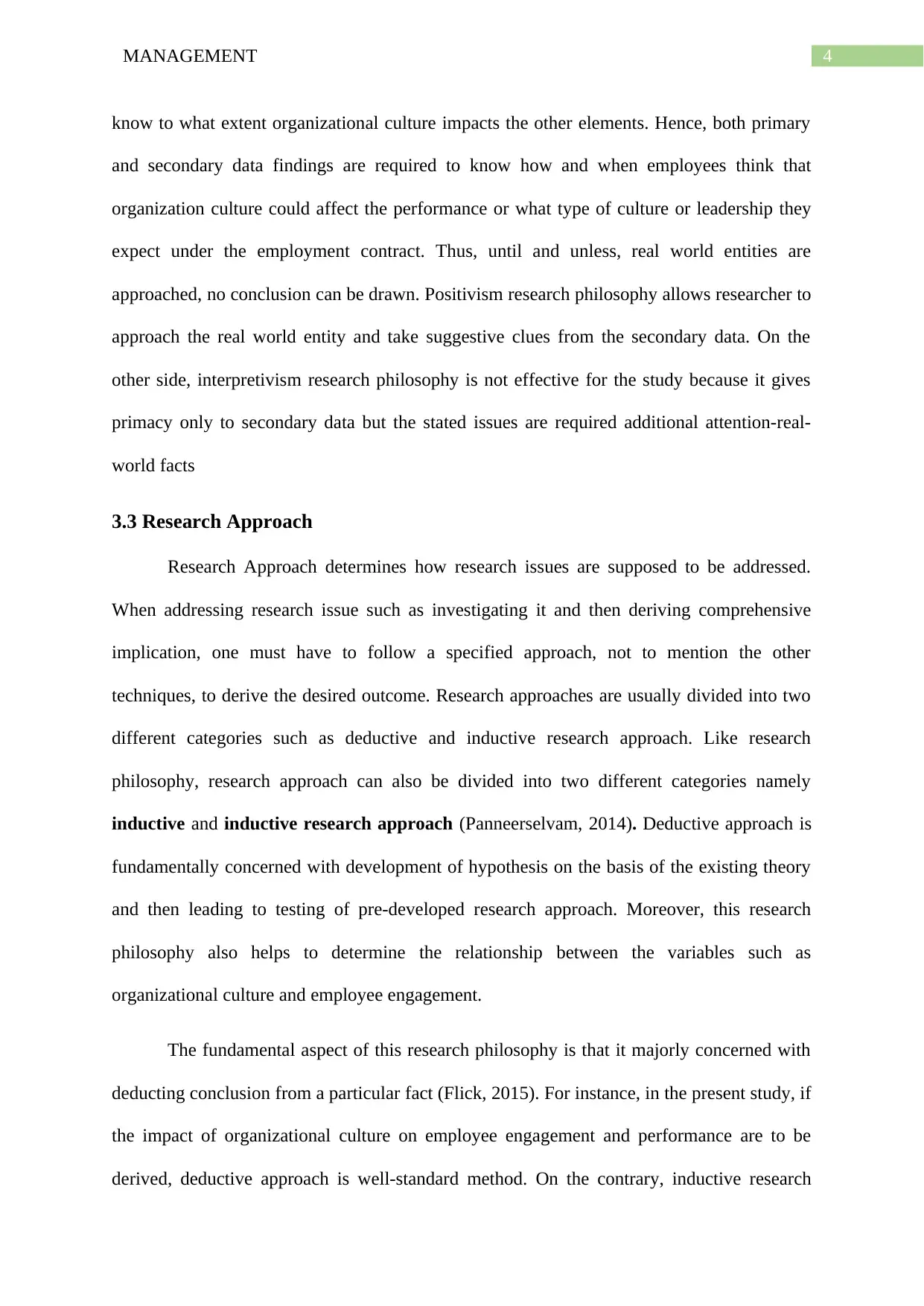
4MANAGEMENT
know to what extent organizational culture impacts the other elements. Hence, both primary
and secondary data findings are required to know how and when employees think that
organization culture could affect the performance or what type of culture or leadership they
expect under the employment contract. Thus, until and unless, real world entities are
approached, no conclusion can be drawn. Positivism research philosophy allows researcher to
approach the real world entity and take suggestive clues from the secondary data. On the
other side, interpretivism research philosophy is not effective for the study because it gives
primacy only to secondary data but the stated issues are required additional attention-real-
world facts
3.3 Research Approach
Research Approach determines how research issues are supposed to be addressed.
When addressing research issue such as investigating it and then deriving comprehensive
implication, one must have to follow a specified approach, not to mention the other
techniques, to derive the desired outcome. Research approaches are usually divided into two
different categories such as deductive and inductive research approach. Like research
philosophy, research approach can also be divided into two different categories namely
inductive and inductive research approach (Panneerselvam, 2014). Deductive approach is
fundamentally concerned with development of hypothesis on the basis of the existing theory
and then leading to testing of pre-developed research approach. Moreover, this research
philosophy also helps to determine the relationship between the variables such as
organizational culture and employee engagement.
The fundamental aspect of this research philosophy is that it majorly concerned with
deducting conclusion from a particular fact (Flick, 2015). For instance, in the present study, if
the impact of organizational culture on employee engagement and performance are to be
derived, deductive approach is well-standard method. On the contrary, inductive research
know to what extent organizational culture impacts the other elements. Hence, both primary
and secondary data findings are required to know how and when employees think that
organization culture could affect the performance or what type of culture or leadership they
expect under the employment contract. Thus, until and unless, real world entities are
approached, no conclusion can be drawn. Positivism research philosophy allows researcher to
approach the real world entity and take suggestive clues from the secondary data. On the
other side, interpretivism research philosophy is not effective for the study because it gives
primacy only to secondary data but the stated issues are required additional attention-real-
world facts
3.3 Research Approach
Research Approach determines how research issues are supposed to be addressed.
When addressing research issue such as investigating it and then deriving comprehensive
implication, one must have to follow a specified approach, not to mention the other
techniques, to derive the desired outcome. Research approaches are usually divided into two
different categories such as deductive and inductive research approach. Like research
philosophy, research approach can also be divided into two different categories namely
inductive and inductive research approach (Panneerselvam, 2014). Deductive approach is
fundamentally concerned with development of hypothesis on the basis of the existing theory
and then leading to testing of pre-developed research approach. Moreover, this research
philosophy also helps to determine the relationship between the variables such as
organizational culture and employee engagement.
The fundamental aspect of this research philosophy is that it majorly concerned with
deducting conclusion from a particular fact (Flick, 2015). For instance, in the present study, if
the impact of organizational culture on employee engagement and performance are to be
derived, deductive approach is well-standard method. On the contrary, inductive research
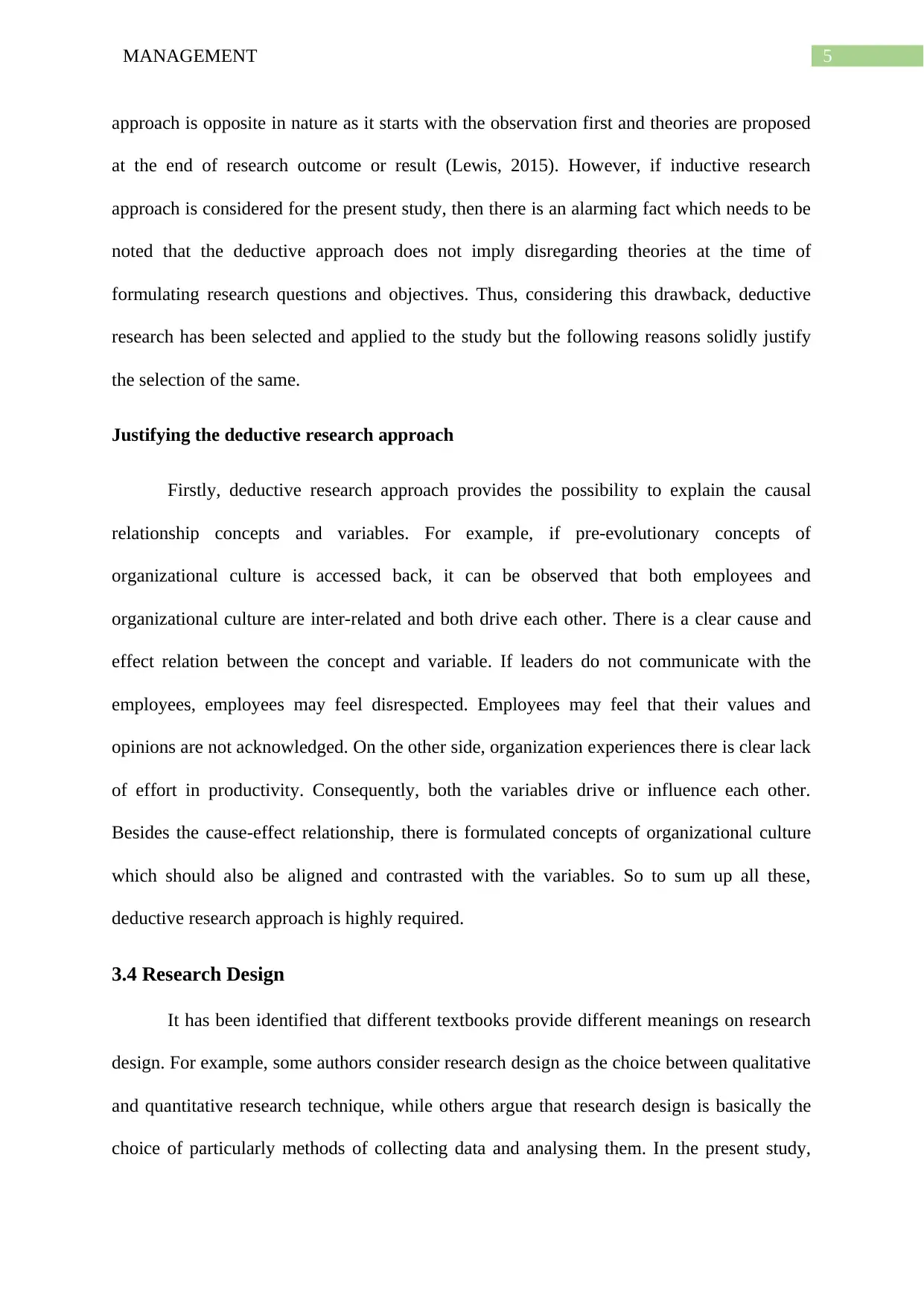
5MANAGEMENT
approach is opposite in nature as it starts with the observation first and theories are proposed
at the end of research outcome or result (Lewis, 2015). However, if inductive research
approach is considered for the present study, then there is an alarming fact which needs to be
noted that the deductive approach does not imply disregarding theories at the time of
formulating research questions and objectives. Thus, considering this drawback, deductive
research has been selected and applied to the study but the following reasons solidly justify
the selection of the same.
Justifying the deductive research approach
Firstly, deductive research approach provides the possibility to explain the causal
relationship concepts and variables. For example, if pre-evolutionary concepts of
organizational culture is accessed back, it can be observed that both employees and
organizational culture are inter-related and both drive each other. There is a clear cause and
effect relation between the concept and variable. If leaders do not communicate with the
employees, employees may feel disrespected. Employees may feel that their values and
opinions are not acknowledged. On the other side, organization experiences there is clear lack
of effort in productivity. Consequently, both the variables drive or influence each other.
Besides the cause-effect relationship, there is formulated concepts of organizational culture
which should also be aligned and contrasted with the variables. So to sum up all these,
deductive research approach is highly required.
3.4 Research Design
It has been identified that different textbooks provide different meanings on research
design. For example, some authors consider research design as the choice between qualitative
and quantitative research technique, while others argue that research design is basically the
choice of particularly methods of collecting data and analysing them. In the present study,
approach is opposite in nature as it starts with the observation first and theories are proposed
at the end of research outcome or result (Lewis, 2015). However, if inductive research
approach is considered for the present study, then there is an alarming fact which needs to be
noted that the deductive approach does not imply disregarding theories at the time of
formulating research questions and objectives. Thus, considering this drawback, deductive
research has been selected and applied to the study but the following reasons solidly justify
the selection of the same.
Justifying the deductive research approach
Firstly, deductive research approach provides the possibility to explain the causal
relationship concepts and variables. For example, if pre-evolutionary concepts of
organizational culture is accessed back, it can be observed that both employees and
organizational culture are inter-related and both drive each other. There is a clear cause and
effect relation between the concept and variable. If leaders do not communicate with the
employees, employees may feel disrespected. Employees may feel that their values and
opinions are not acknowledged. On the other side, organization experiences there is clear lack
of effort in productivity. Consequently, both the variables drive or influence each other.
Besides the cause-effect relationship, there is formulated concepts of organizational culture
which should also be aligned and contrasted with the variables. So to sum up all these,
deductive research approach is highly required.
3.4 Research Design
It has been identified that different textbooks provide different meanings on research
design. For example, some authors consider research design as the choice between qualitative
and quantitative research technique, while others argue that research design is basically the
choice of particularly methods of collecting data and analysing them. In the present study,
⊘ This is a preview!⊘
Do you want full access?
Subscribe today to unlock all pages.

Trusted by 1+ million students worldwide
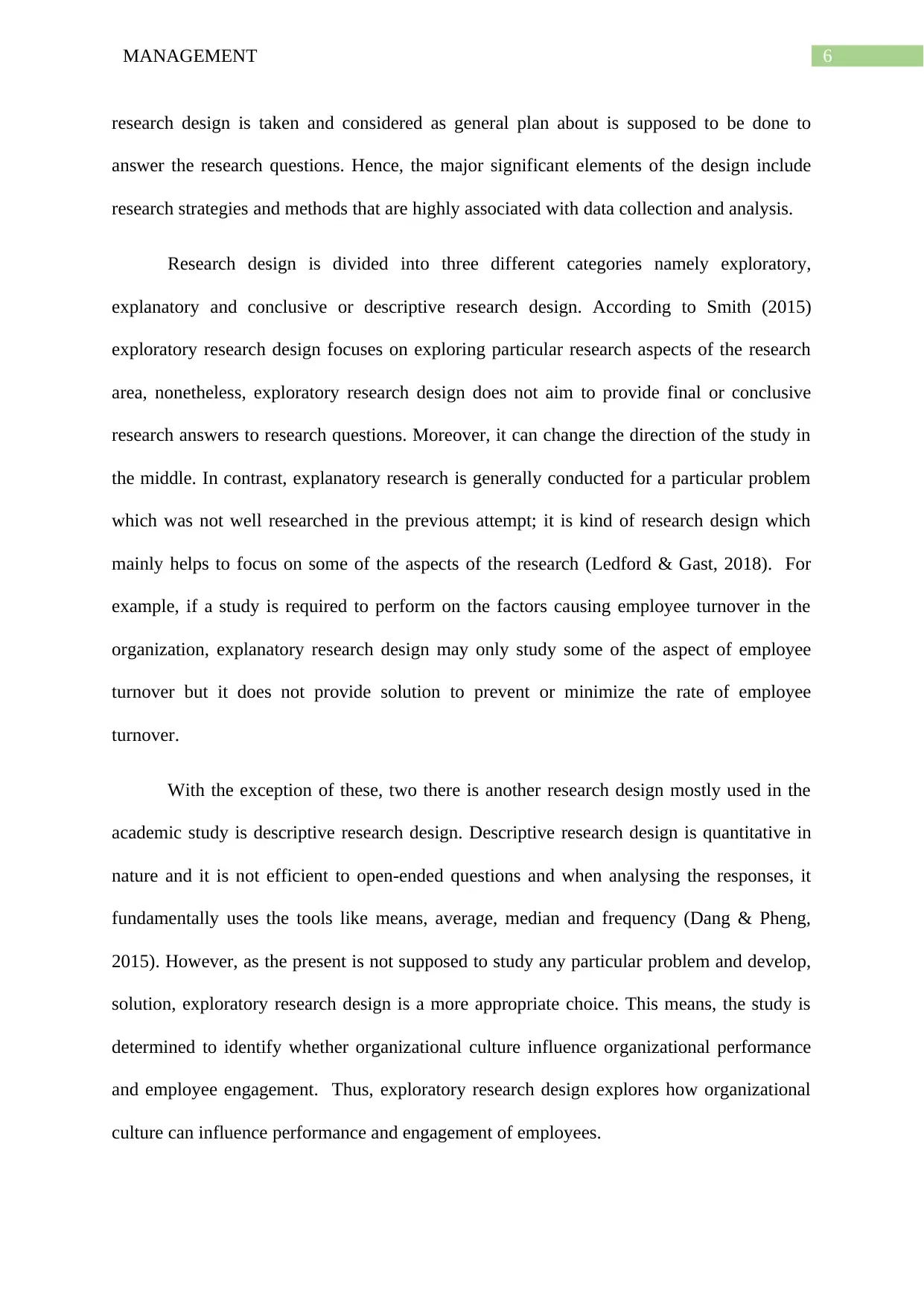
6MANAGEMENT
research design is taken and considered as general plan about is supposed to be done to
answer the research questions. Hence, the major significant elements of the design include
research strategies and methods that are highly associated with data collection and analysis.
Research design is divided into three different categories namely exploratory,
explanatory and conclusive or descriptive research design. According to Smith (2015)
exploratory research design focuses on exploring particular research aspects of the research
area, nonetheless, exploratory research design does not aim to provide final or conclusive
research answers to research questions. Moreover, it can change the direction of the study in
the middle. In contrast, explanatory research is generally conducted for a particular problem
which was not well researched in the previous attempt; it is kind of research design which
mainly helps to focus on some of the aspects of the research (Ledford & Gast, 2018). For
example, if a study is required to perform on the factors causing employee turnover in the
organization, explanatory research design may only study some of the aspect of employee
turnover but it does not provide solution to prevent or minimize the rate of employee
turnover.
With the exception of these, two there is another research design mostly used in the
academic study is descriptive research design. Descriptive research design is quantitative in
nature and it is not efficient to open-ended questions and when analysing the responses, it
fundamentally uses the tools like means, average, median and frequency (Dang & Pheng,
2015). However, as the present is not supposed to study any particular problem and develop,
solution, exploratory research design is a more appropriate choice. This means, the study is
determined to identify whether organizational culture influence organizational performance
and employee engagement. Thus, exploratory research design explores how organizational
culture can influence performance and engagement of employees.
research design is taken and considered as general plan about is supposed to be done to
answer the research questions. Hence, the major significant elements of the design include
research strategies and methods that are highly associated with data collection and analysis.
Research design is divided into three different categories namely exploratory,
explanatory and conclusive or descriptive research design. According to Smith (2015)
exploratory research design focuses on exploring particular research aspects of the research
area, nonetheless, exploratory research design does not aim to provide final or conclusive
research answers to research questions. Moreover, it can change the direction of the study in
the middle. In contrast, explanatory research is generally conducted for a particular problem
which was not well researched in the previous attempt; it is kind of research design which
mainly helps to focus on some of the aspects of the research (Ledford & Gast, 2018). For
example, if a study is required to perform on the factors causing employee turnover in the
organization, explanatory research design may only study some of the aspect of employee
turnover but it does not provide solution to prevent or minimize the rate of employee
turnover.
With the exception of these, two there is another research design mostly used in the
academic study is descriptive research design. Descriptive research design is quantitative in
nature and it is not efficient to open-ended questions and when analysing the responses, it
fundamentally uses the tools like means, average, median and frequency (Dang & Pheng,
2015). However, as the present is not supposed to study any particular problem and develop,
solution, exploratory research design is a more appropriate choice. This means, the study is
determined to identify whether organizational culture influence organizational performance
and employee engagement. Thus, exploratory research design explores how organizational
culture can influence performance and engagement of employees.
Paraphrase This Document
Need a fresh take? Get an instant paraphrase of this document with our AI Paraphraser
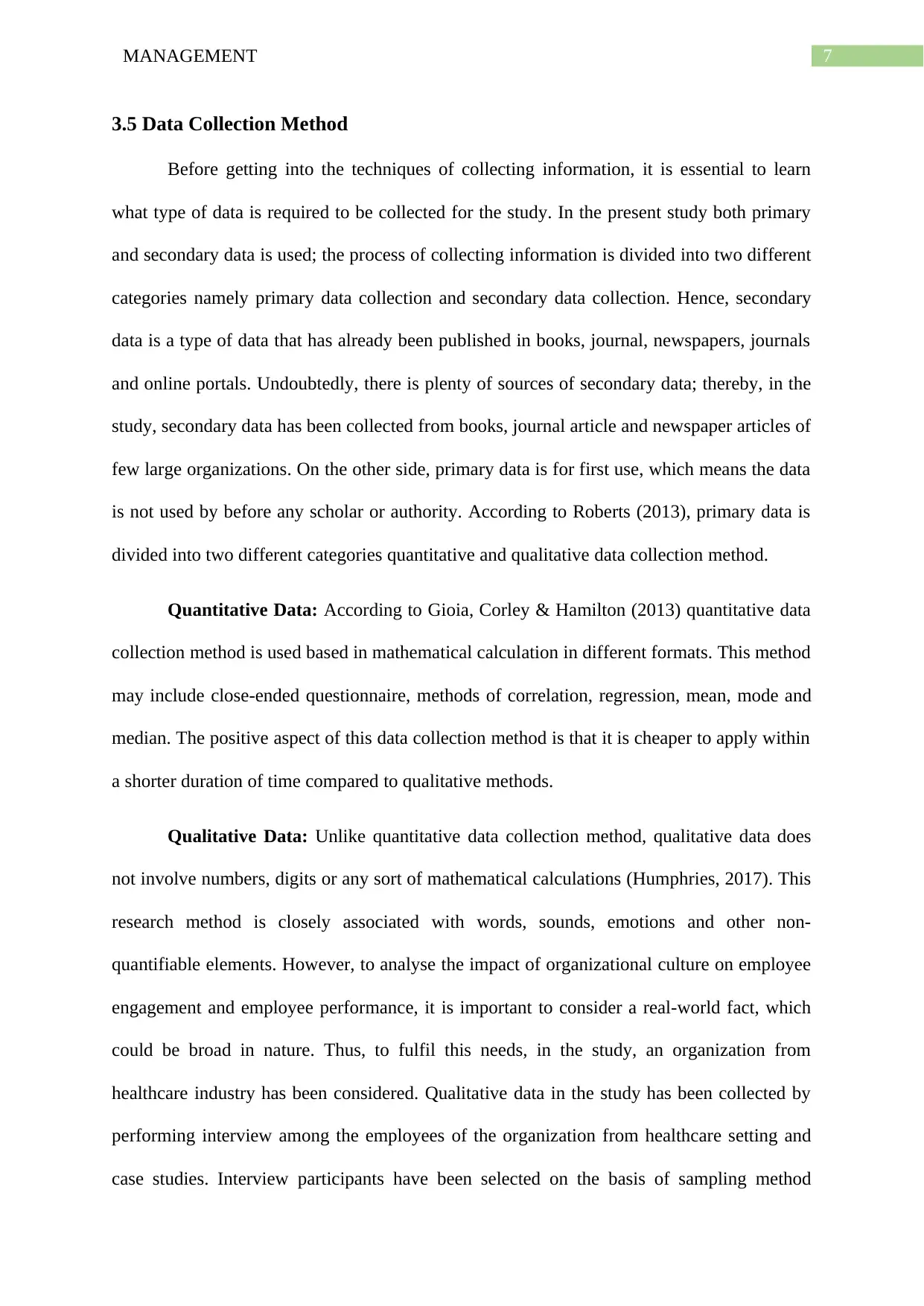
7MANAGEMENT
3.5 Data Collection Method
Before getting into the techniques of collecting information, it is essential to learn
what type of data is required to be collected for the study. In the present study both primary
and secondary data is used; the process of collecting information is divided into two different
categories namely primary data collection and secondary data collection. Hence, secondary
data is a type of data that has already been published in books, journal, newspapers, journals
and online portals. Undoubtedly, there is plenty of sources of secondary data; thereby, in the
study, secondary data has been collected from books, journal article and newspaper articles of
few large organizations. On the other side, primary data is for first use, which means the data
is not used by before any scholar or authority. According to Roberts (2013), primary data is
divided into two different categories quantitative and qualitative data collection method.
Quantitative Data: According to Gioia, Corley & Hamilton (2013) quantitative data
collection method is used based in mathematical calculation in different formats. This method
may include close-ended questionnaire, methods of correlation, regression, mean, mode and
median. The positive aspect of this data collection method is that it is cheaper to apply within
a shorter duration of time compared to qualitative methods.
Qualitative Data: Unlike quantitative data collection method, qualitative data does
not involve numbers, digits or any sort of mathematical calculations (Humphries, 2017). This
research method is closely associated with words, sounds, emotions and other non-
quantifiable elements. However, to analyse the impact of organizational culture on employee
engagement and employee performance, it is important to consider a real-world fact, which
could be broad in nature. Thus, to fulfil this needs, in the study, an organization from
healthcare industry has been considered. Qualitative data in the study has been collected by
performing interview among the employees of the organization from healthcare setting and
case studies. Interview participants have been selected on the basis of sampling method
3.5 Data Collection Method
Before getting into the techniques of collecting information, it is essential to learn
what type of data is required to be collected for the study. In the present study both primary
and secondary data is used; the process of collecting information is divided into two different
categories namely primary data collection and secondary data collection. Hence, secondary
data is a type of data that has already been published in books, journal, newspapers, journals
and online portals. Undoubtedly, there is plenty of sources of secondary data; thereby, in the
study, secondary data has been collected from books, journal article and newspaper articles of
few large organizations. On the other side, primary data is for first use, which means the data
is not used by before any scholar or authority. According to Roberts (2013), primary data is
divided into two different categories quantitative and qualitative data collection method.
Quantitative Data: According to Gioia, Corley & Hamilton (2013) quantitative data
collection method is used based in mathematical calculation in different formats. This method
may include close-ended questionnaire, methods of correlation, regression, mean, mode and
median. The positive aspect of this data collection method is that it is cheaper to apply within
a shorter duration of time compared to qualitative methods.
Qualitative Data: Unlike quantitative data collection method, qualitative data does
not involve numbers, digits or any sort of mathematical calculations (Humphries, 2017). This
research method is closely associated with words, sounds, emotions and other non-
quantifiable elements. However, to analyse the impact of organizational culture on employee
engagement and employee performance, it is important to consider a real-world fact, which
could be broad in nature. Thus, to fulfil this needs, in the study, an organization from
healthcare industry has been considered. Qualitative data in the study has been collected by
performing interview among the employees of the organization from healthcare setting and
case studies. Interview participants have been selected on the basis of sampling method
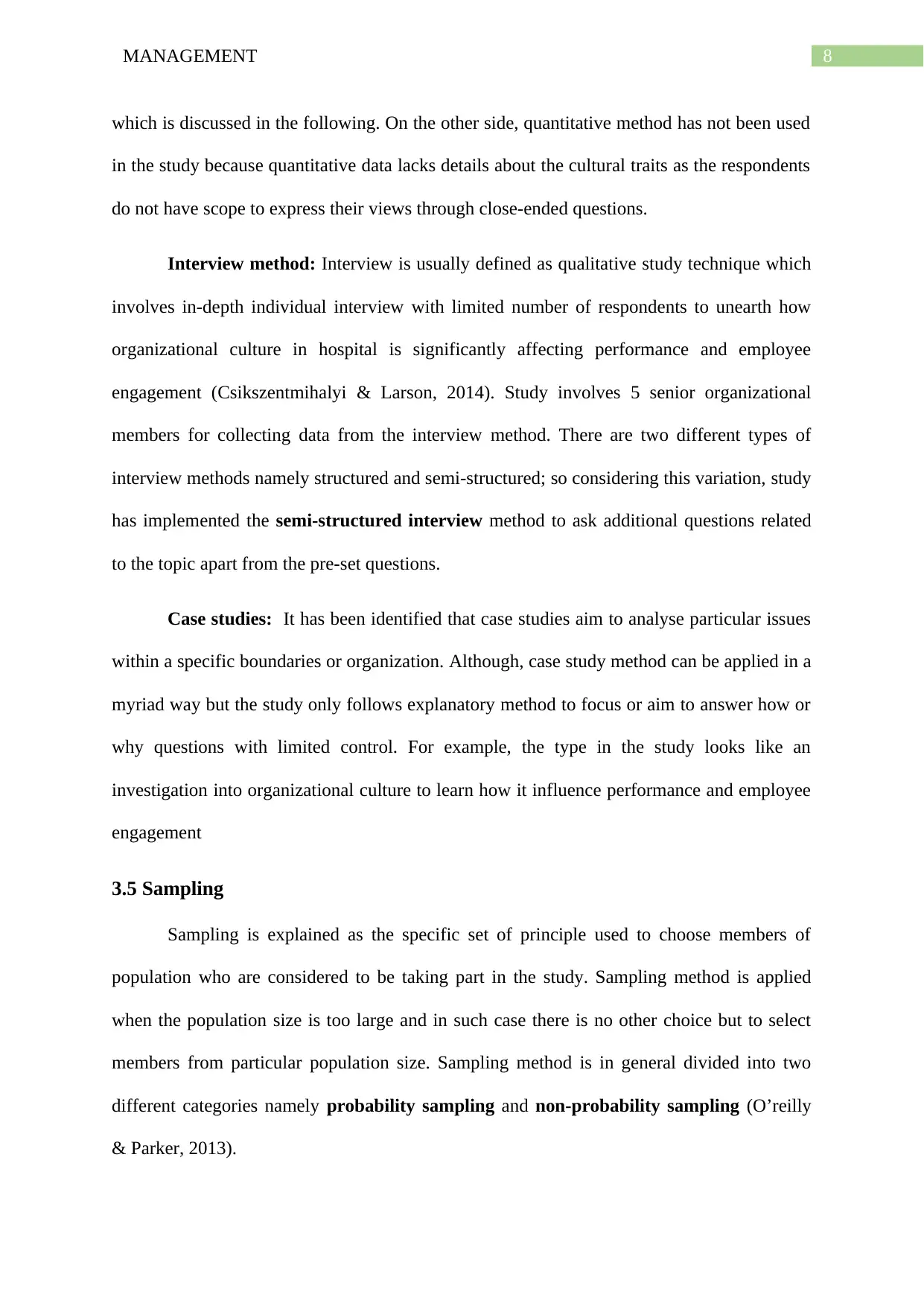
8MANAGEMENT
which is discussed in the following. On the other side, quantitative method has not been used
in the study because quantitative data lacks details about the cultural traits as the respondents
do not have scope to express their views through close-ended questions.
Interview method: Interview is usually defined as qualitative study technique which
involves in-depth individual interview with limited number of respondents to unearth how
organizational culture in hospital is significantly affecting performance and employee
engagement (Csikszentmihalyi & Larson, 2014). Study involves 5 senior organizational
members for collecting data from the interview method. There are two different types of
interview methods namely structured and semi-structured; so considering this variation, study
has implemented the semi-structured interview method to ask additional questions related
to the topic apart from the pre-set questions.
Case studies: It has been identified that case studies aim to analyse particular issues
within a specific boundaries or organization. Although, case study method can be applied in a
myriad way but the study only follows explanatory method to focus or aim to answer how or
why questions with limited control. For example, the type in the study looks like an
investigation into organizational culture to learn how it influence performance and employee
engagement
3.5 Sampling
Sampling is explained as the specific set of principle used to choose members of
population who are considered to be taking part in the study. Sampling method is applied
when the population size is too large and in such case there is no other choice but to select
members from particular population size. Sampling method is in general divided into two
different categories namely probability sampling and non-probability sampling (O’reilly
& Parker, 2013).
which is discussed in the following. On the other side, quantitative method has not been used
in the study because quantitative data lacks details about the cultural traits as the respondents
do not have scope to express their views through close-ended questions.
Interview method: Interview is usually defined as qualitative study technique which
involves in-depth individual interview with limited number of respondents to unearth how
organizational culture in hospital is significantly affecting performance and employee
engagement (Csikszentmihalyi & Larson, 2014). Study involves 5 senior organizational
members for collecting data from the interview method. There are two different types of
interview methods namely structured and semi-structured; so considering this variation, study
has implemented the semi-structured interview method to ask additional questions related
to the topic apart from the pre-set questions.
Case studies: It has been identified that case studies aim to analyse particular issues
within a specific boundaries or organization. Although, case study method can be applied in a
myriad way but the study only follows explanatory method to focus or aim to answer how or
why questions with limited control. For example, the type in the study looks like an
investigation into organizational culture to learn how it influence performance and employee
engagement
3.5 Sampling
Sampling is explained as the specific set of principle used to choose members of
population who are considered to be taking part in the study. Sampling method is applied
when the population size is too large and in such case there is no other choice but to select
members from particular population size. Sampling method is in general divided into two
different categories namely probability sampling and non-probability sampling (O’reilly
& Parker, 2013).
⊘ This is a preview!⊘
Do you want full access?
Subscribe today to unlock all pages.

Trusted by 1+ million students worldwide
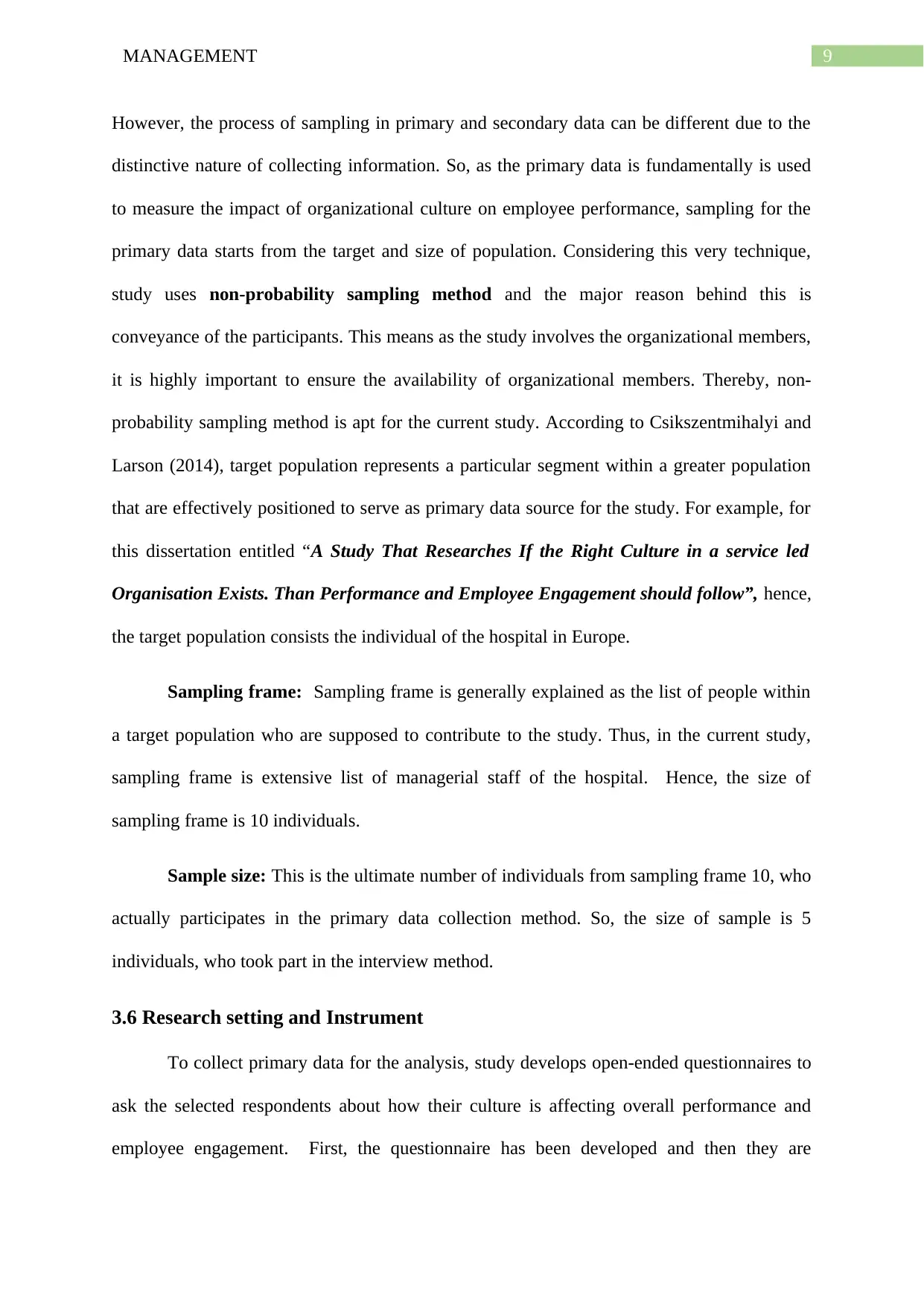
9MANAGEMENT
However, the process of sampling in primary and secondary data can be different due to the
distinctive nature of collecting information. So, as the primary data is fundamentally is used
to measure the impact of organizational culture on employee performance, sampling for the
primary data starts from the target and size of population. Considering this very technique,
study uses non-probability sampling method and the major reason behind this is
conveyance of the participants. This means as the study involves the organizational members,
it is highly important to ensure the availability of organizational members. Thereby, non-
probability sampling method is apt for the current study. According to Csikszentmihalyi and
Larson (2014), target population represents a particular segment within a greater population
that are effectively positioned to serve as primary data source for the study. For example, for
this dissertation entitled “A Study That Researches If the Right Culture in a service led
Organisation Exists. Than Performance and Employee Engagement should follow”, hence,
the target population consists the individual of the hospital in Europe.
Sampling frame: Sampling frame is generally explained as the list of people within
a target population who are supposed to contribute to the study. Thus, in the current study,
sampling frame is extensive list of managerial staff of the hospital. Hence, the size of
sampling frame is 10 individuals.
Sample size: This is the ultimate number of individuals from sampling frame 10, who
actually participates in the primary data collection method. So, the size of sample is 5
individuals, who took part in the interview method.
3.6 Research setting and Instrument
To collect primary data for the analysis, study develops open-ended questionnaires to
ask the selected respondents about how their culture is affecting overall performance and
employee engagement. First, the questionnaire has been developed and then they are
However, the process of sampling in primary and secondary data can be different due to the
distinctive nature of collecting information. So, as the primary data is fundamentally is used
to measure the impact of organizational culture on employee performance, sampling for the
primary data starts from the target and size of population. Considering this very technique,
study uses non-probability sampling method and the major reason behind this is
conveyance of the participants. This means as the study involves the organizational members,
it is highly important to ensure the availability of organizational members. Thereby, non-
probability sampling method is apt for the current study. According to Csikszentmihalyi and
Larson (2014), target population represents a particular segment within a greater population
that are effectively positioned to serve as primary data source for the study. For example, for
this dissertation entitled “A Study That Researches If the Right Culture in a service led
Organisation Exists. Than Performance and Employee Engagement should follow”, hence,
the target population consists the individual of the hospital in Europe.
Sampling frame: Sampling frame is generally explained as the list of people within
a target population who are supposed to contribute to the study. Thus, in the current study,
sampling frame is extensive list of managerial staff of the hospital. Hence, the size of
sampling frame is 10 individuals.
Sample size: This is the ultimate number of individuals from sampling frame 10, who
actually participates in the primary data collection method. So, the size of sample is 5
individuals, who took part in the interview method.
3.6 Research setting and Instrument
To collect primary data for the analysis, study develops open-ended questionnaires to
ask the selected respondents about how their culture is affecting overall performance and
employee engagement. First, the questionnaire has been developed and then they are
Paraphrase This Document
Need a fresh take? Get an instant paraphrase of this document with our AI Paraphraser
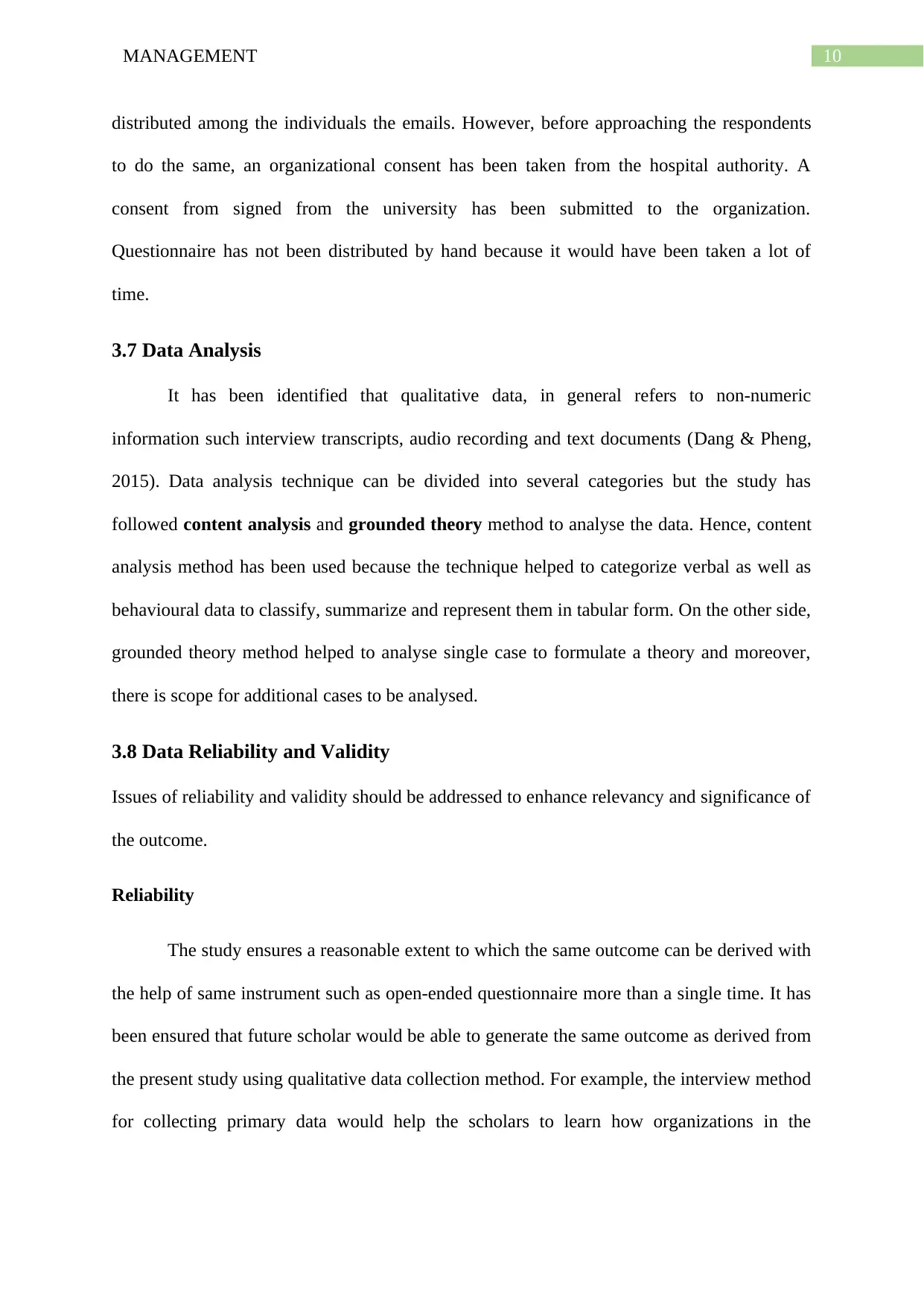
10MANAGEMENT
distributed among the individuals the emails. However, before approaching the respondents
to do the same, an organizational consent has been taken from the hospital authority. A
consent from signed from the university has been submitted to the organization.
Questionnaire has not been distributed by hand because it would have been taken a lot of
time.
3.7 Data Analysis
It has been identified that qualitative data, in general refers to non-numeric
information such interview transcripts, audio recording and text documents (Dang & Pheng,
2015). Data analysis technique can be divided into several categories but the study has
followed content analysis and grounded theory method to analyse the data. Hence, content
analysis method has been used because the technique helped to categorize verbal as well as
behavioural data to classify, summarize and represent them in tabular form. On the other side,
grounded theory method helped to analyse single case to formulate a theory and moreover,
there is scope for additional cases to be analysed.
3.8 Data Reliability and Validity
Issues of reliability and validity should be addressed to enhance relevancy and significance of
the outcome.
Reliability
The study ensures a reasonable extent to which the same outcome can be derived with
the help of same instrument such as open-ended questionnaire more than a single time. It has
been ensured that future scholar would be able to generate the same outcome as derived from
the present study using qualitative data collection method. For example, the interview method
for collecting primary data would help the scholars to learn how organizations in the
distributed among the individuals the emails. However, before approaching the respondents
to do the same, an organizational consent has been taken from the hospital authority. A
consent from signed from the university has been submitted to the organization.
Questionnaire has not been distributed by hand because it would have been taken a lot of
time.
3.7 Data Analysis
It has been identified that qualitative data, in general refers to non-numeric
information such interview transcripts, audio recording and text documents (Dang & Pheng,
2015). Data analysis technique can be divided into several categories but the study has
followed content analysis and grounded theory method to analyse the data. Hence, content
analysis method has been used because the technique helped to categorize verbal as well as
behavioural data to classify, summarize and represent them in tabular form. On the other side,
grounded theory method helped to analyse single case to formulate a theory and moreover,
there is scope for additional cases to be analysed.
3.8 Data Reliability and Validity
Issues of reliability and validity should be addressed to enhance relevancy and significance of
the outcome.
Reliability
The study ensures a reasonable extent to which the same outcome can be derived with
the help of same instrument such as open-ended questionnaire more than a single time. It has
been ensured that future scholar would be able to generate the same outcome as derived from
the present study using qualitative data collection method. For example, the interview method
for collecting primary data would help the scholars to learn how organizations in the
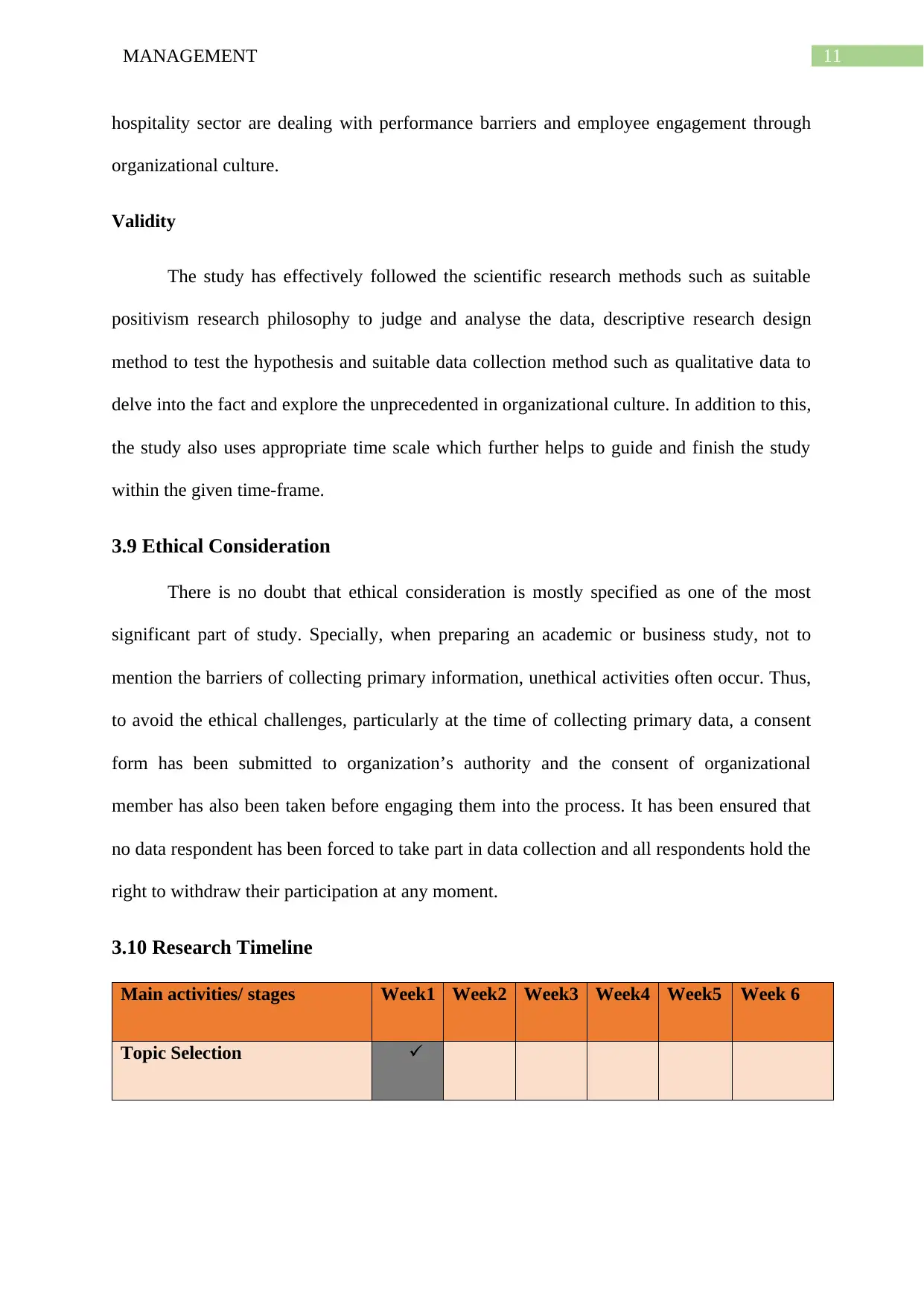
11MANAGEMENT
hospitality sector are dealing with performance barriers and employee engagement through
organizational culture.
Validity
The study has effectively followed the scientific research methods such as suitable
positivism research philosophy to judge and analyse the data, descriptive research design
method to test the hypothesis and suitable data collection method such as qualitative data to
delve into the fact and explore the unprecedented in organizational culture. In addition to this,
the study also uses appropriate time scale which further helps to guide and finish the study
within the given time-frame.
3.9 Ethical Consideration
There is no doubt that ethical consideration is mostly specified as one of the most
significant part of study. Specially, when preparing an academic or business study, not to
mention the barriers of collecting primary information, unethical activities often occur. Thus,
to avoid the ethical challenges, particularly at the time of collecting primary data, a consent
form has been submitted to organization’s authority and the consent of organizational
member has also been taken before engaging them into the process. It has been ensured that
no data respondent has been forced to take part in data collection and all respondents hold the
right to withdraw their participation at any moment.
3.10 Research Timeline
Main activities/ stages Week1 Week2 Week3 Week4 Week5 Week 6
Topic Selection
hospitality sector are dealing with performance barriers and employee engagement through
organizational culture.
Validity
The study has effectively followed the scientific research methods such as suitable
positivism research philosophy to judge and analyse the data, descriptive research design
method to test the hypothesis and suitable data collection method such as qualitative data to
delve into the fact and explore the unprecedented in organizational culture. In addition to this,
the study also uses appropriate time scale which further helps to guide and finish the study
within the given time-frame.
3.9 Ethical Consideration
There is no doubt that ethical consideration is mostly specified as one of the most
significant part of study. Specially, when preparing an academic or business study, not to
mention the barriers of collecting primary information, unethical activities often occur. Thus,
to avoid the ethical challenges, particularly at the time of collecting primary data, a consent
form has been submitted to organization’s authority and the consent of organizational
member has also been taken before engaging them into the process. It has been ensured that
no data respondent has been forced to take part in data collection and all respondents hold the
right to withdraw their participation at any moment.
3.10 Research Timeline
Main activities/ stages Week1 Week2 Week3 Week4 Week5 Week 6
Topic Selection
⊘ This is a preview!⊘
Do you want full access?
Subscribe today to unlock all pages.

Trusted by 1+ million students worldwide
1 out of 16
Related Documents
Your All-in-One AI-Powered Toolkit for Academic Success.
+13062052269
info@desklib.com
Available 24*7 on WhatsApp / Email
![[object Object]](/_next/static/media/star-bottom.7253800d.svg)
Unlock your academic potential
Copyright © 2020–2026 A2Z Services. All Rights Reserved. Developed and managed by ZUCOL.





